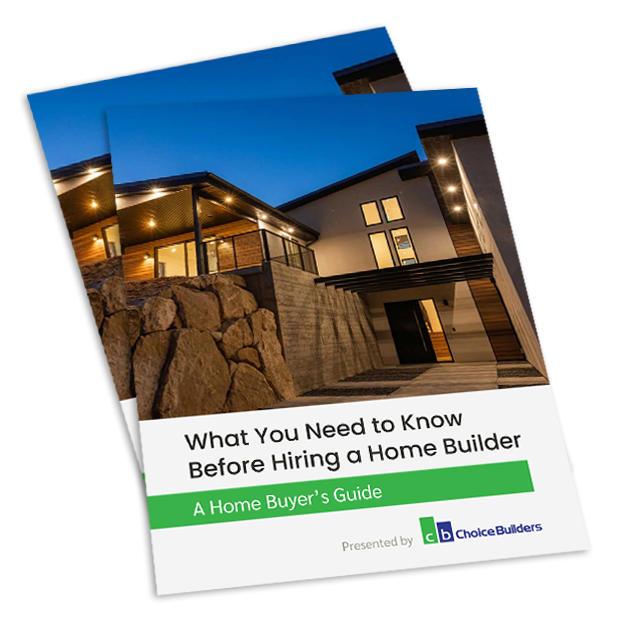Build on Your Own Lot
Design and build your one-of-a-kind home from the ground up with Choice Builders
Have You Found the Perfect Place to Call Home?
-
Do you have lots of questions about building a custom home from scratch?
-
Are you unsure how the land purchasing process works?
-
Do you already own land but need help taking full advantage of it?
If any of this sounds familiar, the Choice Builders’ team can get your project underway.
Your Guide From Dirt to Done
We understand that you want your home to be truly custom, and that vision starts with a unique piece of property. We’ve built hundreds of homes from small town settings to high in the mountains, so we know what’s involved in successfully fitting a home into its site. Whether you’ve already bought a lot or are still looking, now’s the time to discuss the process and how your finished home will look and feel.
-
35+ years of experience
-
Iron County Home Builders Association member
-
Cedar City Festival of Homes Award Winner
Here to Serve You
Lot Assessment
Our team is happy to look at a few lots with you to determine their buildability.
Custom Design
We work with you to design a home that sits perfectly on its site and makes you happy.
Quality Construction
From clearing the site to putting on the final coat of paint, we pay attention to every detail.
Land or Builder? Which Comes First?
Does it matter if you choose your land before your builder or your designer before your land? Based on our experience, yes, it does matter. See what our team suggests in this video:
Location, Location, Location
Southern Utah offers a range of options for building your luxury custom home. Our clients have found land they love throughout the region, including in:
Where would you like to start your next chapter?
What Our Clients Say
""I was amazed at the way Roger builds his homes. It's different than any other builder I've ever seen. I found it easy to work with Choice Builders and I just like Roger's overall presence and determination to make sure I'm happy."
– Jo A Lewandowski
Don’t Trust Your Dreams to Just Anyone
You should feel confident and excited during your home-building process. After all, the builder you choose could mean the difference between a project that's done right, on time and on budget, and one that costs too much, takes too long and is fraught with quality problems.
But with every builder claiming to be qualified, how can you be sure you’re picking the right one?
Download What You Need to Know Before Hiring a Home Builder, written by Choice Builders’ owner, Roger Thomas. This guide will help you choose a builder who is right for you.
In it, you'll find answers to questions like:
- How do I make sure a contractor can build to my budget?
- Why do some contractors appear to cost more than others do?
- Should I ask for a “free” estimate?
- How do I choose a good contractor, let alone the best one?
- How should I compare prospective contractors?
Get the Guide

Don’t Settle for Ordinary
Some builders only work in certain community developments and don’t take the time to build one-off, bespoke homes. If you want to build on your own lot, be sure to choose a builder that can make the most of your site’s unique characteristics.
The “Better Way to Build” Plan

Tell us about your ideas and vision.

Be fully informed and in control of the process.

Live in a home that’s exactly what you wanted.
FAQs
Start by defining your ideal location and lifestyle. Consider factors like proximity to amenities (schools, shopping, recreation), privacy, views and future development plans for the area. Consider working with a real estate agent specializing in land or luxury properties. Online real estate portals, local listings and driving through desired areas can also be helpful. Don't underestimate the power of networking: Let people and your builder know what you're looking for!
- Zoning and regulations: Understand local zoning ordinances regarding building size, setbacks, height restrictions and permitted uses.
- Topography and soil conditions: Assess the slope, drainage and soil composition. You might need to conduct soil testing (percolation test for septic systems, geotechnical report for foundation stability).
- Utilities: Determine the availability and cost of connecting to essential utilities like water, sewer, electricity, gas and internet. Consider well and septic systems if public utilities aren't available.
- Access and easements: Ensure legal and physical access to the property. Understand any existing easements (rights granted to others to use a portion of your land).
- Environmental factors: Investigate potential environmental concerns like wetlands, flood zones, protected species or past contamination.
- Views and natural features: Consider the aesthetic appeal, sunlight exposure and any natural elements like trees, streams or rock formations.
- Neighborhood and community: Research the surrounding area, property values and any homeowner association (HOA) rules and fees.
A land specialist possesses expertise in zoning laws, development potential and unique challenges associated with land transactions. They can help you identify suitable properties, negotiate effectively and navigate the complexities of the purchase process.
A professional land survey is crucial. It precisely defines the property boundaries, identifies easements and reveals any encroachments. This protects your investment and prevents future boundary disputes with neighbors.
The process generally includes:
- Defining your needs and budget.
- Finding potential properties.
- Conducting due diligence (inspections, surveys, title search).
- Making an offer and negotiating the terms.
- Securing financing (if needed).
- Signing the purchase agreement and completing the closing process.
Several factors influence land value, including location, size, zoning, topography, availability of utilities and recent comparable sales in the area. A real estate appraiser specializing in land can provide a professional valuation. Your real estate agent can also offer insights based on their market knowledge.
Land loans typically have different terms and interest rates compared to traditional home mortgages. Home equity loans or lines of credit are possible if you own another property. You could also research specialty lenders that focus specifically on land financing. Paying cash is the simplest option if you have the funds.
Due diligence is the process of thoroughly investigating the property before finalizing the purchase. It's crucial for uncovering potential issues that could impact your ability to build or the long-term value of your investment. This includes reviewing legal documents (title, easements), conducting inspections (environmental, soil) and verifying zoning regulations.
Collaborate closely with your builder early in the process. They can assess the site's constraints and opportunities, ensuring your general design ideas complement the land's characteristics. Factors like slope, soil stability and sun orientation will influence the design and construction methods.
Be prepared for potential expenses beyond the land purchase and house construction, such as:
- Site preparation: Clearing, grading, excavation and foundation work.
- Utility connections: Extending water, sewer, electricity and gas lines to the property.
- Well and septic system installation (if applicable).
- Driveway and landscaping.
- Permitting fees and impact fees.
- Insurance during construction.
